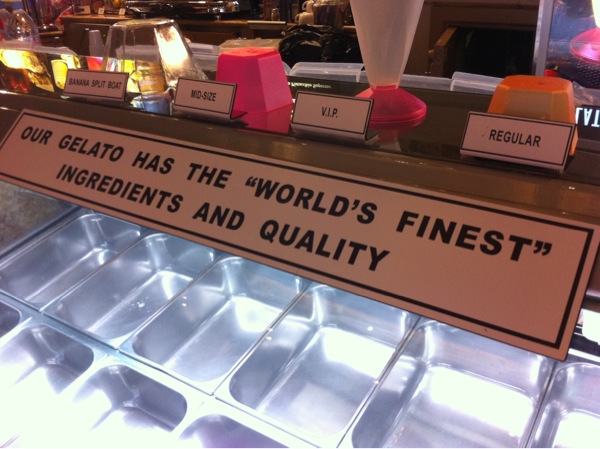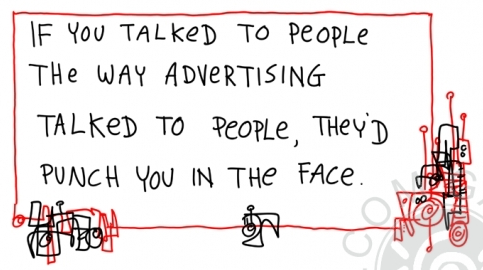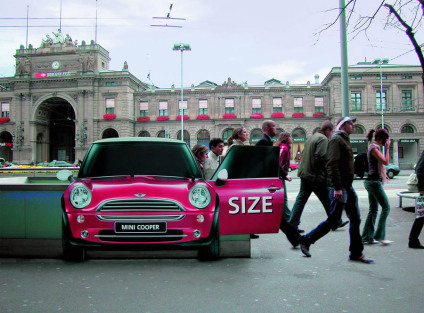Free Work
One of the cheapest and most effective ways to advertise is to give your work away for free. In the right hands, this sort of immersion is very powerful and the idea spreads, almost effortlessly. There are two risks...you give it away to the wrong people, people who would otherwise have no interest...and that your product is average. Both produce the same outcome...the price they are willing to pay is at or near zero. The pressure then is to do something so remarkable that even in the wrong hands it seems satisfactory.
Then there's the fear factor. People who are afraid to give anything away, a song, an ebook or a recipe are hiding behind the false notion that this somehow protects them and their pricing strategy. The worry is that someone will steal their idea and benefit from it. In reality, this sort of theft isn't that difficult anymore. So, the protection effort and the associated annoyances to the fan base are hardly worth it. But, more importantly, what they don't understand is that most people don't want something for free, especially if it's really great. There is an inherent quality in most of us that wants to reward people for brilliant work. So, again, the ultimate form of protection is to do something that matters, that creates such a stir that it compels people to talk about it.
All roads lead to remarkable as the best insurance policy.
If You're Going to Shout...
The Battle for Engagement
I've been in a battle...for a long time. Sometimes the battle is with co-workers, sometimes with bosses, sometimes with myself. Nevertheless it's a battle...to overcome tradition. All my marketing professors, virtually all of my peers and every marketing firm I've ever hired have spent a great deal of time trying to convince me that I'm somehow flawed in my thinking that engaging with people should take precedence over shouting at them.
My argument is based on a simple notion...you have a better chance of practicing art when you're engaged with someone than when it's a one way conversation. Engaged, I have a better shot at making someone feel comfortable, cared for and welcome. Engaged, I have a better chance of building a loyal audience of raving fans. And far less of a chance to annoy them.
Here's the problem...there are serious counter forces at work. Traditional marketing (specifically promotions) is simply easier and safer to do than engagement. There is a huge body of evidence (albeit outdated) and countless pundits that will convince you that banner ads, tv and radio commercials, billboards, email blasts and table tents are the answer to generating more customers and more sales. Generally speaking, this old way of doing things doesn't require much in the way of meaningful content as long a you have a big ad budget. Of course, most of us don't have that...a big marketing budget. Even so, we find our way to tradition somehow, some way. And the paradox continues...in the absence of remarkable content and engagement we're left with the only option...to shout and hope for a favorable response.
For every dollar and minute you spend hanging on to tradition, you rob yourself of the opportunity to engage and build a relationship with a customer, to inspire front line staff to do meaningful work...to do something that matters. I encourage you to begin replacing traditional marketing with engagement activities, perhaps slowly at first. But, later as you gain momentum and the word begins to spread, you'll find yourself measuring referrals, evangelist incentives and rewards instead of click through's and 800 number counts. And, you'll find yourself in a happier place.
Legacy work isn't born from tradition, it's born from hard, meaningful work, done by heretics that often scare others away.
A Tall Order

Never promise what you can't deliver exceptionally well...all the time.
Spend more time listening and learning. Making bold statements is way overrated.
There's a Sucker Born Every Minute
Not anymore. In fact, there never was. People have never been dumb. Most just weren't motivated to seek an alternative, especially about things that didn't originate in their own town. You knew if farmer John's milk was good...you could ask a neighbor. It was much harder to know if the Sears catalog was lying to you. The problem wasn't smarts. There just wasn't a reliable way to learn. Enter ubiquitous high-speed bandwidth...today's internet. It changed everything, especially the rules about keeping people in the dark.
Last week a company tried to sell me spark plugs and spark plug wires for more than five hundred dollars. The same products were available outside the shop for under a hundred. The jig wasn't hard to figure out. When I asked them about it, no problem..."just bring in your own parts". A sucker punch. Here's a national, well recognized brand, categorically ignoring all the new rules of customer care and marketing hoping to pull a fast one on people. What do they really hope to gain? Makes you wonder.
Most trickery is more subtle. An ad campaign that promises the best meal while the restaurant is consistently empty. A website that boasts fabulous customer service while overbooking practices drive people mad.
Try covering up your lousy restaurant.
Try hiding the fact that your hotel is dirty.
Try fooling people to pay more for an airline seat.
Try keeping people from talking with each other about your service.
You can't do it.
On the flip side, try hiding the passion and enthusiasm of your best people.
And, try keeping your secret sauce a secret.
Or, try keeping people from spreading your fabulous idea.
You can't do that either.
So, are you going to do average work, spending time to keep people in the dark, hoping to find a few suckers? Or, are you going to get busy doing things you want people to talk about.
Unfortunately, you have to decide.
Pardon the Interruption
Push vs. Pull
A friend recently ask my opinion on how he could spread the word about a new service. He was considering emailing people and posting notes on Facebook, among other things. After offering some suggestions for posting content to various online outlets (flickr, website, twitter, vimeo, linkedin, etc.), I thought about push vs. pull. Most people want to go out and tell (or yell) about what they have to offer...understandably, they're excited about sharing something new. And, while you can generate some results pushing your message with email, unsolicited ecards, etc., it's not the most effective way to get the word to spread. The best way is to allow yourself some time and create a bucket load of fabulous content that will garner some attention. Then, leak it out to some close friends, give some of your product away for free and give people access on as many relevant outlets as possible. Once you have a fan base, ask them if they would care for an occasional email update of your goings on. Repeat.
While it's far easier to hit send on an email blast, the harder stuff almost always works better and longer.
Advertising Isn't Dead...It's Broken
The old model, selling people features and benefits, doesn't work anymore. There's too much clutter. Unless you're a gazillionaire, you don't stand much of a chance. However, you could change your approach. You could adapt to a new marketing order and use advertising for a completely different purpose. You could use ads as an opportunity to begin a conversation... instead of selling products. A quick rewind of recent advertising history might help put this into perspective.
Prior to radio and TV, if you had something to sell to people outside your immediate area, you bought print ads and billboards. It was a straightforward system, the more ads you bought, the more you would likely sell. Soon, competitors started advertising too. And, "what" you said about a product was overshadowed by "how" it was said...the advertising profession was born. Things started changing with the advent of TV. Slowly, as more and more companies could afford to advertise, we started to see ads which were designed to entertain instead of sell. Some companies figured it was better to get people to talk about the ad, not just the product. That required loads of creativity and money...it was hard. But, those ads rose above the clutter. They convinced us that the people behind the products were interesting, imaginative and funny...that they were real people, not just big companies. Their ads created an emotional connection and started a conversation. Those companies won. Life was good. The internet (specifically, wide distribution of broadband) changed the game again. The cost barrier to entry was lowered to practically zero. Companies of all sizes and even individuals could get into the act. Viral marketing as we now know it was born. But, cheap led to a very low signal to noise ratio...lots of junk and more clutter than ever. Instead of working harder to start a conversation, companies abused the system and tried pushing old tactics in a new medium. And then, the death spiral began...ads became cheaper, which meant you could buy more ads, which led to more clutter and an increasingly ineffective mechanism. More and more people stopped paying attention.
Fast forward...If you think of customer conversations as the lifeblood of your business, you understand all this. You know how important it is for customers to go out and tell your story. Respectively, that's what you spend most of your time and money on...engaging with customers and reinventing your product and story to keep things fresh. And, as a new marketer you know that advertising is your chance to connect with people and stimulate conversation. You understand that it's not just a space to interrupt someone and sell them something. You've studied marketing history and know what not to do. So, you wouldn't waste time and money placing boring ads that look and sound like everyone else's. Instead, you would try this sort of thing.
The Power of a Hug
The power of a hug is remarkable. It goes further than a nice smile, pleasant hello and a handshake. It goes further than using someone's name or recognizing a repeat guest...it goes a lot further. It crosses a line. It gets personal...it means you really do care. There's no disguising your feelings once you give someone a hug.
Doubletree can't buy enough ads to convince people they care this much...neither can you. So, spend the ad money on a Louree Jefferson. Better yet, a bunch of them.
P.S. Do you think Louree needs a resume? Most remarkable people don't.
HEY!
The overdoing it syndrome is now in full force. More color, more bold, more gimmicks...all in an effort to prove you're doing more for people. When, in reality, you're annoying them. This is what happens when desperation takes effect. We look for quick, easy strikes. Too late if that's all you've got...shouting does not make you more interesting.




